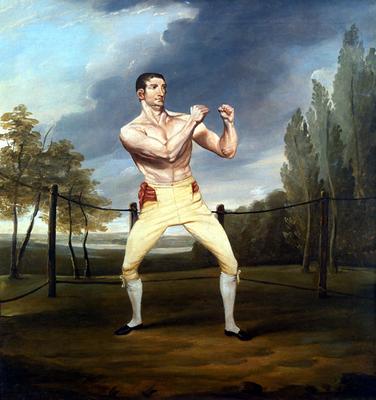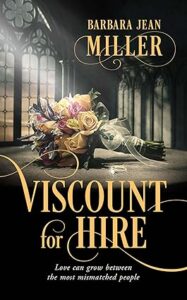 “Tom came to London in the year 1803, when his brother Jem was at the zenith of his fame, having beaten every man with whom he had fought, and attained the position of undisputed Champion of England. Although Tom’s ring career was not so brilliant as his elder brother’s , it had a less striking culmination and fall, and his thirteen battles, with eight victories and a draw (with the phenomenon Dutch Sam), tell well for Tom’s descent from the Slacks and Belchers.”
“Tom came to London in the year 1803, when his brother Jem was at the zenith of his fame, having beaten every man with whom he had fought, and attained the position of undisputed Champion of England. Although Tom’s ring career was not so brilliant as his elder brother’s , it had a less striking culmination and fall, and his thirteen battles, with eight victories and a draw (with the phenomenon Dutch Sam), tell well for Tom’s descent from the Slacks and Belchers.”
– Henry Downes Miles
Thomas Belcher, one of Regency’s great boxers, was probably more of a hetero-man crush than a sex symbols to ladies. But this fine figure of muscle and might oft beat his heavier weight opponents (he was a lightweight at 150 lbs) with skill and a reported “scientific” approach.
His brother, Jem Belcher, was perhaps more successful but due to a series of bad gambling debts went to prison and died in 1811.
Tom, although not as famous at mills, lived a much more successful life. In 1821 he was among those selected by Gentleman John Jackson to guard the entrance to Westminster Abbey at the coronation of George IV.
From correspondence of Byron and Hazlitt, it would appear Belcher was well acquainted with Corinthians and gentleman, who admired his skill and equippage in the ring. Byron mentions a mill organized to pit Belcher against Doughtery which was foiled by a police raid.
Belcher hailed from Bristol, apparently a hot bed of boxers; famous Tom Cribb, as well as others hailed from the Midlands city.
Although he would never be a champion, he was often seen as “stylish” and well-mannered. In Pierce Egan’s Book of Sports, he describes Belchers as “sprightly, stylish” chap who took over the landlordship of Castle Tavern in Holborn in 1814. The Castle Tavern was a well known boxing hot spot where mills could be seen and bets placed.
Of Belcher’s takeover, Egan says that refinishing of the rooms spoke of “elegance and cleanliness, backed with civility, were the order of the day.” The Fancy (or the community of boxers and boxing lovers) quickly rallied around the prize fighter, who had so nobly conducted himself in thirteen fights, and Tom Belcher’s Castle Tavern quickly became one of the favorite well appointed boxing clubs in London. Shortly after Belcher took over, the Daffy Club was formed creating a quick rivalry.
Supporters of the Castle even had a little song:
After a fourteen year stint as owner of the Castle Tavern, and watching the sport of boxing begin to wane, Tom retired to a snug cottage in “the country” of Finchley Common with his gun and dog, content to bag game and occasionally visit Town to drink and carouse with his mates.
“Prize fighting was enormously popular during the second half of the eighteenth century in Britain. It became a fashion…by contemporary men of all classes as the “culture of sensibility” that describes this period of increasing politeness in society. This juxtaposition illustrates a vexing eighteenth-century issue: could a man be both polite and manly?…The gentleman boxer synthesized traditionally held views of manliness with the civilizing effects of modern consumerism, acknowledged the concerns and aspirations of men of all classes, and responded to the political imperative for fighting men capable of forging a new nation bent on empire building. The gentleman boxer was both polite and manly and a fine example of a masculine identity negotiated between individual conceptions of the self and the material circumstances in which that self is found.” Downing, 2011, The Gentleman Boxer: Boxing, Manners and Masculinity in Eighteenth-Century England.
For the boxing basics, check out: http://www.reginascott.com/box.htm












Great post! What year did he take over Castle Tavern? Just trying to figure out when he presided over it….
He assumed control “under the auspices of his sincere friend and almost father, Mr. John Shelton” in the summer of 1814. Tom Spring succeeded him in 1828, when Belcher retired to the country after “not only a long but rich innings,” not precisely “in showers of gold” but with enough of the “Sweetners of Life” to outfit his country cottage with creature comforts and even have a Bank savings “for a rainy day.”
Cool, thank you!!
Pingback: Regency Hot Spots: The Daffy Club « Regency Reader